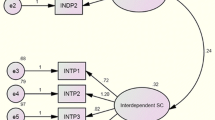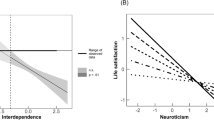Abstract
The present study investigated the role of self-construal in explaining psychological wellbeing in two European countries. Eight hundred and fifteen Italian and Scottish students completed measures of life-satisfaction, optimism, subjective happiness and a scale measuring interdependent and/or independent self-construal. We obtained three main findings. First of all, scores on the scales of psychological wellbeing were positively associated with scores on the independent scale and independence was found to be the factor that best explained variance in psychological wellbeing. Second, and contrary to our prediction, the Italian group had significantly higher scores for the independence scale than Scots. Third, gender was found to have a significant effect with regard to interdependence of self, life satisfaction, and optimism.
Similar content being viewed by others
References
Ahuvia, A. C. (2001). Individualism/collectivism and cultures of happiness: A theoretical conjecture on the relationship between consumption, culture and wellbeing at the national level. Journal of Happiness Studies, 3, 23–36.
Andrews, F. M., & Withey, S. B. (1976). Social indicators of wellbeing: Americans’ perceptions of life quality. New York: Plenum.
Anolli, L. (2005). L’ottimismo. Il Mulino: Bologna [The optimism].
Brody, L. R., & Hall, J. A. (2008). Gender and emotion in context. In M. Lewis, J. M. Haviland-Jones, & L. F. Barrett (Eds.), Handbook of emotions. New York: Guilford Press.
Camfield, L., Crivello, G., & Woodhead, M. (2009). Wellbeing research in developing countries: Reviewing the role of qualitative methods. Social Indicators Research, 90(1), 5–31.
Chang, W. C., Osman, M. M. B., Tong, E. M. W., & Tan, D. (2011). Self-construal and wellbeing in two ethnic communities in Singapore. Psychology, 2, 63–70.
Chapin, J. (2001). Self-protective pessimism: Optimistic bias in reverse. North American Journal of Psychology, 3, 253–262.
Craig, C. (2007). Creating confidence: A handbook for professionals working with young people. Glasgow: Centre for Confidence and Wellbeing and Hay-Nisbett.
Cross, S. E., Bacon, P. L., & Morris, M. L. (2000). The relational-interdependent self-construal and relationships. Journal of Personality and Social Psychology, 78(4), 791–808.
Cross, S. E., Gore, J. S., & Morris, M. L. (2003). The relational-interdependent self-construal, self-concept consistency, and wellbeing. Journal of Personality and Social Psychology, 85(5), 933–944.
Cross, S. E., Hardin, E., & Gercek-Swing, B. (2011). The what, how, why and where of self-construal. Personality and Social Psychology Review, 15(2), 142–179.
Cross, S. E., & Madson, L. (1997). Models of the self: Self-construals and gender. Psychological Bulletin, 122(1), 5–37.
Cross, S. E., Morris, M. L., & Gore, J. S. (2002). Thinking about oneself and others: The relational interdependent self-construal and social cognition. Journal of Personality and Social Psychology, 82, 399–418.
Daukantaite, D., & Bergman, L. R. (2005). Childhood roots of women’s wellbeing: The role of optimism. European Journal of Psychology, 10, 287–297.
Delle Fave, A., & Bassi, M. (2000). The quality of experience in adolescent’s daily lives: Developmental perspectives. Genetic, Social and General Psychological Monographs, 126, 347–367.
Diener, E. (2000). Well-being. The science of happiness and proposal for a National Index. American Psychologist, 55, 34–43.
Diener, E., & Chan, M. Y. (2011). Happy people live longer: Wellbeing contributes to health and longevity. Applied Psychology: Health and Well-being, 3, 1–43.
Diener, E., & Diener, M. (1995). Cross-cultural correlates of life satisfaction and self-esteem. Journal of Personality and Social Psychology, 68, 653–663.
Diener, E., Emmons, R. A., Larsen, R. J., & Griffin, S. (1985). The satisfaction with life scale. Journal of Personality Assessment, 49, 71–75.
Diener, E., Oishi, S., & Lucas, R. E. (2003). Personality, culture, and wellbeing: Emotional and cognitive evaluations of life. Annual Review of Psychology, 54, 403–425.
Duncan, E., & Grazzani Gavazzi, I. (2004). Positive emotional experiences in Scottish and Italian young adults: A diary study. Journal of Happiness Studies, 5, 359–384.
Duncan, E., Grazzani, I., & Subba, U. (2009). Reflections on positive psychology. In L. Bortolotti (Ed.), Philosophy and happiness (pp. 119–129). London: Palgrave Macmillan.
Eid, M., & Larsen, R. J. (2008). The science of wellbeing. New York: Guilford Press.
Elliott, I., & Coker, S. (2008). Independent self-construal, self-reflection, and self-rumination: A path model for predicting happiness. Australian Journal of Psychology, 60(3), 127–134.
Fiske, A. P. (2002). Using individualism and collectivism to compare cultures—a critique of the validity and measurement of the construct. Psychological Bulletin, 128, 78–88.
Galloway, S. (2006). Quality of life and well-being: Measuring the benefits of culture and sports: Literature review and thinkpiece. Centre for Cultural Policy Research, University of Glasgow. http://www.scotland.gov.uk/Publications/2006/01/13110743/0.
Gilligan, C. (1982). In a different voice: Psychological theory and women’s development. Cambridge, MA: Harvard University Press.
Hird, S. (2003). Individual wellbeing: A report for the Scottish executive and Scottish neighbourhood statistics. August 2003. NHS Health, Scotland.
Hyun, K. J. (2000). Is an independent self a requisite for Asian immigrants’ psychological wellbeing in the US? The case of Korean Americans. Journal of Human Behavior in the Social Environment, 3(3–4), 179–200.
Isaacowitz, D. (2005). Correlates of wellbeing in adulthood and old age: A tale of two optimists. Journal of Personality, 39(2), 224–244.
Kahn, R. L., & Juster, F. T. (2002). Wellbeing: Concepts and measures. Journal of Social Issues, 58, 627–644.
Kahneman, D., Diener, E., & Schwarz, N. (Eds.). (1999). Wellbeing: The foundations of hedonic psychology. New York, NY: Russell Sage Foundation.
Kahneman, D., Krueger, A. B., Schkade, D., Schwarz, N., & Stone, A. (2004). Toward national wellbeing accounts. American Economic Review: Papers and Proceedings, 94(2), 429–434.
Kwan, V. S. Y., Bond, M. H., & Singelis, T. S. (1997). Pancultural explanations for life satisfaction: Adding relationship harmony to self-esteem. Journal of Personality and Social Psychology, 73, 1038–1051.
Lai, J. C. L., & Cheng, S. T. (2004). Health beliefs, optimism, and health-related decisions: A study with Hong Kong Chinese. International Journal of Psychology, 39, 179–189.
Lohman, N. (1977). Correlations of life satisfaction, moral and adjustment measures. Journal of Gerontology, 32, 73–75.
Lyubomirsky, S. (2001). Why are some people happier than others? American Psychologist, 56(3), 239–249.
Lyubomirsky, S. (2008). The how of happiness: A scientific approach to getting the life you want. New York: Penguin Press.
Lyubomirsky, S., & Lepper, H. S. (1999). A measure of subjective happiness: Preliminary reliability and construct validation. Social Indicators Research, 46, 137–155.
Makikangas, A., & Kinnunen, U. (2003). Psychosocial work stressors and wellbeing: Self-esteem and optimism as moderators in a one year longitudinal sample. Personality and Individual Differences, 35(3), 537–557.
Markus, H. R., & Kitayama, S. (1991). Culture and the self: Implications for cognition, emotion and motivation. Psychological Review, 98, 224–253.
Markus, H. R., & Kitayama, S. (1994). A collective fear of the collective: Implications for selves and theories of selves. Personality and Social Psychology Bulletin, 20, 568–579.
Matsumoto, D. (1999). Culture and self. An empirical assessment of Markus and Kitayama’s theory of independent and interdependent self-construals. Asian Journal of Social Psychology, 2, 289–310.
Oishi, S. (2001). Culture and memory for emotional experiences: On-line versus retrospective judgments of subjective well-being. Dissertation Abstract International, 61(10-B), 5625.
Oishi, S., Diener, E., Lucas, R. E., & Suh, E. M. (1999). Cross-cultural variations in predictors of life satisfaction: Perspectives from needs and values. Personality and Social Psychology Bulletin, 25, 980–990.
Oyserman, D., Coon, H., & Kemmelmeier, M. (2002). Rethinking individualism and collectivism: Evaluation of theoretical assumptions and meta-analyses. Psychological Bulletin, 128, 3–73.
Pedhazur, E. J. (1997). Multiple regression in behavioural research (2nd ed.). Fort Worth, TX: Harcourt Brace.
Scheier, M. F., Carver, C. S., & Bridges, M. W. (1994). Distinguishing optimism from neuroticism: A re-evaluation of the life orientation test. Journal of Personality and Social Psychology, 67, 1063–1078.
Sheldon, K. M., Ryan, R. M., Rawsthorne, L. J., & Ilardi, B. (1997). Trait self and true self: Cross-role variation in the big-five personality traits and its relations with psychological authenticity and wellbeing. Journal of Personality and Social Psychology, 73, 1380–1393.
Singelis, T. M. (1994). The measurement of independent and interdependent self-construal. Personality and Social Psychology Bulletin, 20(5), 580–591.
Singelis, T., Bond, M. H., Sharkey, W. F., & Lai, C. S. Y. (1999). Unpacking culture’s influence on self-esteem and embarrassability. The role of self-construals. Journal of Cross-Cultural Psychology, 30(3), 315–341.
Singelis, T. M., Yamada, A. M., Barrio, C., Laney, J. H., Her, P., Ruiz-Anaya, A., et al. (2006). Metric equivalence of the bi-dimensional acculturation scale, the satisfaction, with life scale, and the self-construal scale and English language version. Hispanic Journal of Behavioural Sciences, 28, 231–244.
Suh, E. M. (2000). Self, the hyphen between culture and subjective well-being. In E. Diener & E. M. Suh (Eds.), Culture and subjective well-being (pp. 63–86). Cambridge, MA: MIT Press.
Suh, E., Diener, E., Oishi, S., & Triandis, H. C. (1998). The shifting basis of the life satisfaction judgments across cultures: Emotions versus norms. Journal of Personality and Social Psychology, 74, 482–493.
Suh, E. M., & Oishi, S. (2002). Subjective well-being across cultures. In W. Lonner, D. L. Dinnel, S. A. Hayes & D. N. Sattler (Eds.), Online readings in psychology and culture. http://www.wwu.edu/~culture. Center for Cross-Cultural Research, Western Washington University, Bellingham, WA.
Tennant, R., Hiller, L., Fishwick, R., Platt, S., Joseph, S., Weich, S., et al. (2007). The Warwick-Edinburgh Mental Wellbeing Scale (WEMWBS): Development and UK validation. Health and Quality of Life Outcomes, 5(63), 1–13.
Tov, W., & Diener, E. (2007). Culture and wellbeing. In S. Kitayama & D. Cohen (Eds.), Handbook of cultural psychology (pp. 691–713). New York: Guilford.
Triandis, H. D. (1989). The self and social behaviour in differing cultural contexts. Psychological Review, 96, 506–520.
Utz, S. (2004). Self-activation is a two-edged sword: The effects of primes on co-operation. Journal of Experimental Social Psychology, 40, 769–776.
Veenhoven, R. (1993). Happiness in nations. Subjective appreciation of life in 56 nations, 1946–1992. RISBO, Erasmus University, Rotterdam. Updated version on Internet: http://www.eur.nl/fsw/research/happiness/.
Veenhoven, R. (2007). Subjective measures of wellbeing. In McGillivray (Ed.). Human wellbeing’, concept and measurement (pp. 214–239). New Hampshire: Palgrave/McMillan.
Wrosch, C., & Scheier, M. F. (2003). Personality and quality of life: The importance of optimism and goal adjustment. Quality of Life Research, 12, 59–72.
You, J., Fung, H. H., & Isaacowitz, D. M. (2009). Age differences in dispositional optimism: A cross-cultural study. European Journal of Aging, 6, 247–252.
Acknowledgments
This research was supported by a grant from F.A.R.—2007 (University of Milano-Bicocca) to Prof. Ilaria Grazzani. We wish to thank Dr. Clare O’Sullivan for the English revision of the paper, and Dr. Alessandro Pepe for his assistance with the statistical analysis.
Author information
Authors and Affiliations
Corresponding author
Rights and permissions
About this article
Cite this article
Duncan, E., Ornaghi, V. & Grazzani, I. Self-Construal and Psychological Wellbeing in Scottish and Italian Young Adults. J Happiness Stud 14, 1145–1161 (2013). https://doi.org/10.1007/s10902-012-9372-0
Published:
Issue Date:
DOI: https://doi.org/10.1007/s10902-012-9372-0




